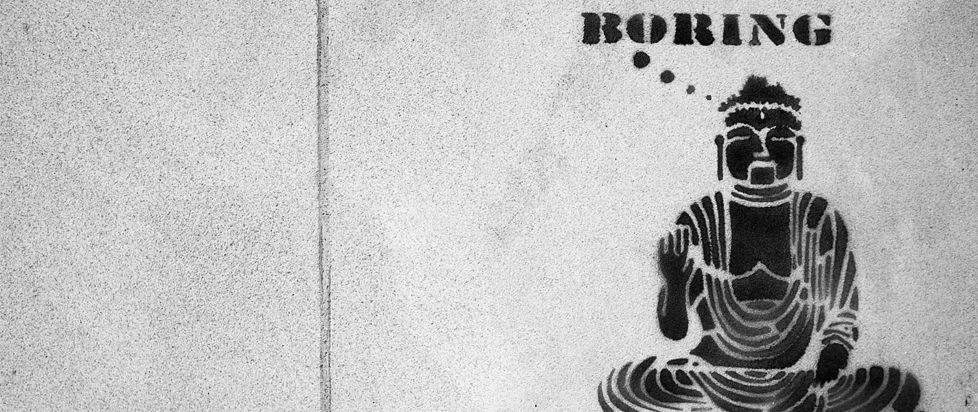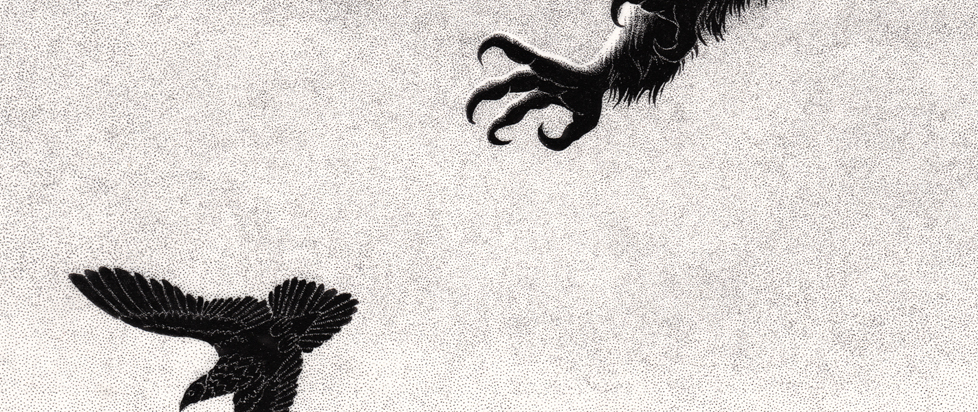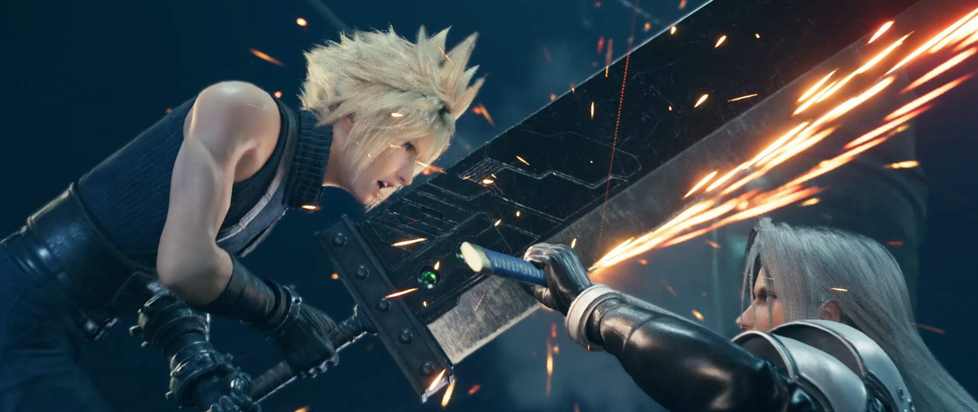
Music and Memory in Midgar
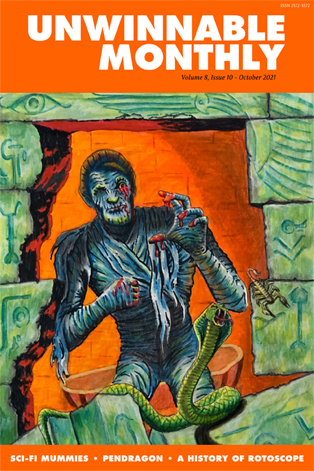
This column is a reprint from Unwinnable Monthly #144. If you like what you see, grab the magazine for less than ten dollars, or subscribe and get all future magazines for half price.
———
Bucking the critical consensus.
———
Back in 2005, Square Enix hinted at the idea of remaking its most popular game, Final Fantasy VII, though the company wasn’t actually working on anything like that. It wasn’t until nearly 10 years later that Square would begin development on the project, eventually releasing Final Fantasy VII Remake in April of 2020. 23 years had passed between the two releases. The world had changed, and Square wanted this game to recognize that. To do so, they conceptualized Remake as more than just one title, instead developing it as the first episode in a series that expanded on the story told in 1997.
Audiences familiar with the original FF7 may have been surprised by what they ended up playing last year. Square had taken some liberties in recreating the story of Cloud Strife, the city of Midgar and the fate of the Planet. In the process, the team behind Remake repurposed this narrative, using it as a way to comment on the implications of revisiting a beloved, wildly popular story more than two decades after it debuted. Even the game’s music, which adapts and adds to the original by composer Nobuo Uematsu, helps reshape the story itself.
The scope of the musical score for Remake is massive. It ultimately involved the contributions of more than 20 composers and arrangers, whose work was coordinated, supervised and supplemented by Masashi Hamauzu and Mitsuto Suzuki (who previously worked together on the Final Fantasy XIII trilogy). Square has published two official soundtracks so far: a main release plus a supplement that includes songs that didn’t make it onto the first. Combined, the two contain over 250 tracks totaling more than 12 hours of music. This quantity of music is partly a result of its dynamic nature, as it evolves to support the action on screen, and partly because there’s so little repetition. Almost everything gets a unique musical treatment, though it may be based on familiar motifs.

Unlike the original game, for example, there’s no single battle theme. Instead, there are seemingly dozens of possible battle cues to match different locations and levels of intensity. Other recurring motifs are handled similarly: Tifa’s introduction scene features a brilliant symphonic rendition of her theme from the original game, but it never gets reused. Later scenes that focus on her character use totally separate arrangements of her theme across an array of genres. It’s pretty stunning to hear just how much music there is while playing. The game seems to constantly introduce new, fully realized musical concepts. It’s tough to comprehend the logistics required – even just the sheer amount of labor involved – in pulling off a score of this scale and caliber.
Given the enormous popularity and enduring reputation of the original game, it’s understandable that Remake’s adaptations of the original’s most famous themes have received the greatest attention and analysis. These orchestral arrangements sound exceptional in their own right, but for audiences who grew up playing FF7 and internalized the way that world sounded on the PlayStation, they might be especially striking. FF7 made such an impact in 1997 in part because it sought to incorporate aspects of blockbuster cinematic storytelling into the videogame form. The technology of the time limited this ambition, though, so while many players and critics were impressed, they likely also recognized the gap between what was intended and what was possible.
As far as the music is concerned, though, Remake closes that gap. Whether that’s a good or bad thing in every case has been a source of debate. Remake goes for the full symphonic treatment often and shifting so much of the original’s electronic sound to an orchestral palette is a specific stylistic choice that affects the tone of Remake’s world. Uematsu may have chosen synthesized sounds partially due to hardware limitations, but that electronic soundscape also vividly reinforced the game’s cyberpunk aesthetic and dystopian atmosphere. Remake’s transformation of these pieces into orchestral compositions might not ring true for players who felt that that sonic connection was crucial to the overall experience. But Remake’s adaptation of the score absolutely embodies the cinematic ambition of the original game in a certain sense, as the use of the symphony here captures the grand feel of classic Hollywood scores. (Shotaro Shima’s excellent arrangements of tracks like Tifa’s theme, “Let the Battles Begin,” or the main theme are especially effective at evoking this.)
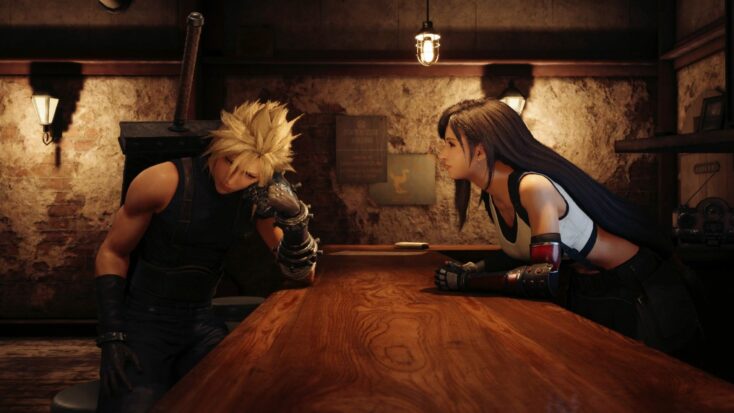
So, the focus on this aspect of the game’s score isn’t too surprising. What is a bit more surprising is how much new musical material is also in here. Remake has a significant amount of new content – it introduces new characters, plotlines and locations, all of which likely presented an interesting challenge to the development team: should they adapt existing musical pieces for this material or write new ones? They ended up choosing a combination of both, so Remake features tons of ideas that have no parallel or precedent in the original. And these tracks are often just as compelling as the adaptations, though for different reasons.
There’s a particularly effective example of this about 10 hours into the game. Cloud has been temporarily staying with Aerith and her mother at their house in Midgar’s Sector 5 slums, but decides he needs to travel to Sector 7. Aerith’s mother asks Cloud to leave in the middle of the night while Aerith is asleep to prevent her from accompanying him (assuming that whatever he’s doing will be dangerous) and Cloud complies. As he’s leaving the area, though, he instead finds Aerith waiting for him, ready to act as his guide to Sector 7, and they head out together.
In the original FF7, the moment ends here – the characters walk off screen and the game loads the next area, a collapsed highway which has battles to fight and no further dialog. Remake extends the scene, adding a new sequence in which Aerith and Cloud stroll down a path illuminated by distant city lights while talking. The section lasts just a couple of minutes, but it expands on the relationship between the two characters in an unexpected, unassuming way.

Square could’ve scored this scene with a variation on existing material, given that it focuses entirely on two of the most recognizable characters in the company’s history, but instead the team opted for a new cue called “Midnight Rendezvous” by Mitsuto Suzuki. What’s interesting here is that Suzuki doesn’t go for an orchestral sound. It’s an electronic track that lacks references to any of the musical motifs from the original game, but its atmosphere manages to evoke a deep sense of nostalgia anyway.
It’s tough to pinpoint exactly how it does this – maybe that’s why it works! – but I think it’s a combination of clear and memorable melodies (also a hallmark of Uematsu’s approach) and Suzuki’s selection of modern sounds that feel almost like they evolved from the instruments Uematsu favored on his PS1-era scores. (Compare the synth bells on tracks like “Anxious Heart,” “Flowers Blooming in the Church” or in the iconic opening scene to the main melody in “Midnight Rendezvous.”) The sounds Suzuki employs aren’t identical to Uematsu’s, but they feel reminiscent of his choices, and they immediately create a familiar space for the listener.
The result is a cue that suggests a feeling of having already experienced something that hasn’t happened yet. It feels almost as if the player is stepping into a moment pulled directly from a bygone era of game development. In doing this, the song adds dimension to the scene by underlining a nice tension that’s at the core of Remake’s entire narrative design.
As mentioned earlier, Remake isn’t a strict retelling of the original game’s story. It significantly expands on (or pads out, depending on your perspective) what was effectively the prologue of the original game, turning a few hours in 1997 into 40 hours today. But Remake goes further than adding new plot points. It reframes the story itself to reflect the fact that it is a retelling. Throughout the narrative, the game emphasizes its own self-awareness of what’s involved in the process of creating a new version of an old story.
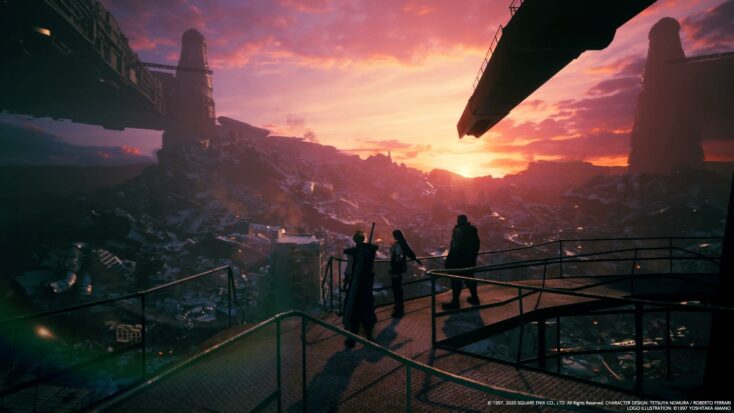
It does this by playing with the concept of destiny, which initially feels awkwardly appended to a plot that was already overstuffed with material when it debuted. But the game gradually reveals that this theme is actually central to what this new iteration of the story is trying to accomplish. Cloud is no longer suffering just from painful flashbacks to moments he can’t fully remember, but also from painful visions of what might be fragments of the future (that players may recognize as scenes from the original game). Other characters seem to have foresight into their fate – or, perhaps more accurately, they have an awareness that their lives have already played out one way, with certain outcomes and that their actions now may be deviating from what was once a settled matter. By the game’s final act, these ideas become central to the choices characters make and the direction of the plot.
Remake ultimately asks the player to consider what it means to revisit a story they already know well. This question is used to amplify the drama of several sequences; by depicting the cast as challenging its destiny, the game can raise the stakes of certain scenes to heights that weren’t attainable in those early moments of the original (this is not the best choice in all cases – too much high-octane drama can be a problem). At other times, though, Remake uses this question in more understated ways, adding a bittersweet and almost tragic quality to quieter scenes.
“Midnight Rendezvous” and the scene it underscores exemplify what the entire project is attempting to do with its reframing of the FF7 story. And while it’s a nice bit of characterization on its own, the scene doesn’t really capture that specific sentiment without the music. The track enriches the moment, adding emotional context beyond what’s spoken. But this material is unfamiliar, so the nostalgia here doesn’t make much sense unless the game is embracing the idea that the audience knows these characters and knows of an anticipated outcome. This story has been told before. Everyone knows how it ends. What if it went differently?
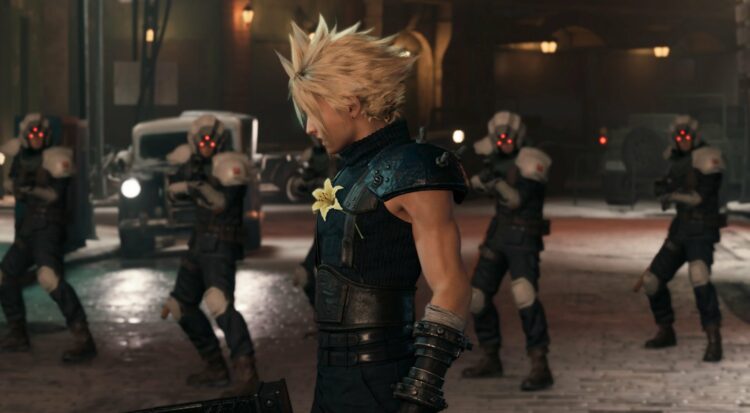
Here, Remake offers two of its heroes a new opportunity to get to know each other better, though it’s a brief one. By extension, it also gives audiences more time with a pair of characters some of them have spent 20 years clamoring for more time with. In departing from the original script, the possibility space suddenly opens up. Things could be different this time. And by this game’s conclusion, circumstances will definitely have diverged from audience expectations. But during this sequence, before any of those differences have become clear, players aren’t quite sure what to expect yet
Maybe this scene, then, is proposing something else instead. What if the outcome doesn’t go differently than last time around? Would that change how the audience feels? Would they still welcome the chance to spend more time with these characters, or is the experience a bit more complicated or conflicted than expected? And if audiences realize they don’t want things to be too different, then what were they really looking for in revisiting this story
The contemporary media landscape is filled with remakes, reboots, and continuations of stories that were assumed to be finished years ago. Inherent to these works is the assumption that spending increasingly more time with familiar stories and characters is desirable in and of itself, regardless of whatever resolutions and conclusions they’d reached earlier. Some of these productions have been rewarded financially many times over for this assumption; others haven’t been so warmly received. Few of them actually spend much time at all thinking about this assumption and its implications, though.
Whether or not the relationship an audience had to a story was informed by the cultural context of the time, or where someone was at in their life when they encountered it, or the unique combination of talents working on it, or even just pure novelty – these and other factors aren’t really considered relevant to what most of these productions are trying to do. And as a result, they don’t put much effort into considering how experiencing these revived stories might be different for an audience today.
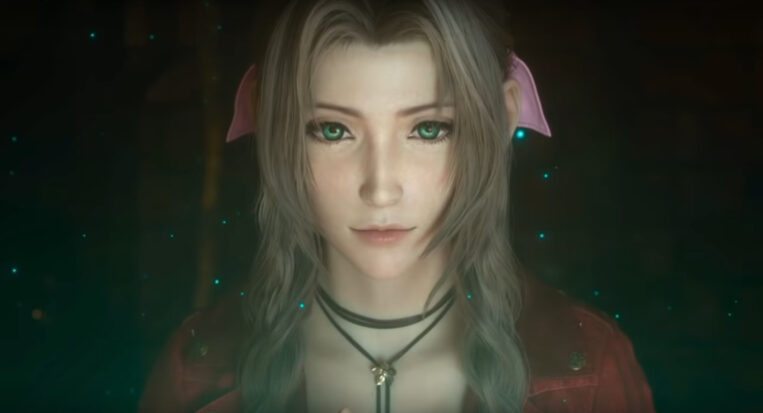
That Remake exists at all is an endorsement of the idea that it’s good to revisit and redo these stories, but it also encourages the audience to consider these questions instead of avoid them entirely. It’s a flawed vehicle for this, for sure. Square turning the Remake project into an expanded, multi-part experience with no end in sight and multiple purchases means that the whole undertaking epitomizes the issues mentioned above. But I think the game is surprisingly thoughtful and sincere at times, too, and it’s filled with exceptional craft.
When it’s at its best, Remake asks audiences to think about their own motivations and expectations in wanting to go back to these stories – not just as they were, but reimagined somehow. In these moments, the game prompts players to consider what it was that made their original experience so distinct and memorable and where they’ve been since that first playthrough. It asks if it’s possible to capture that same magic again, and if so, whether it would look and sound the same. But these are tough questions for anyone to answer.
———
Adam Boffa is a writer and musician from New Jersey. You can follow him on Twitter @Ambinate.



